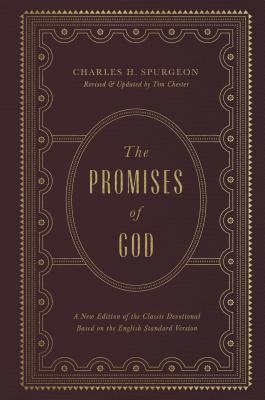- Bible
- Read the Bible
- Bible Versions
- Verse of the Day
- Reading Plans
- Verses by Topic
- Books of the Bible
- Bible Images
- Study
- Commentaries
- Concordances
- Dictionaries
- Encyclopedias
- Sermons
- Bible Atlas & Maps
- BP Wiki
- Devotionals
- Today's Devotionals
- Light of the World
- All Devotionals
- Inspirational Quotes
- More
- Picture Quotes
- Videos
- Inspirational
- Bible Study
- What The Bible Says
- Bible Q&As
- Daily Bread
- Bible by Genre
- Bible Stories
- Random Bible Verse
- Community
- Store
The Promises of God: A New Edition of the Classic Devotional Based on the English Standard Version
by C.H. Spurgeon
God has given no pledge that he will not redeem and encouraged no hope that he will not fulfill.God has given no pledge that he will not redeem and encouraged no hope that he will not fulfill.
--Charles SpurgeonCharles Spurgeon
For over 150 years, Charles Spurgeon's classic daily devotional on God's promises has comforted the hearts of God's people. For each day of the year, Spurgeon reflects on a specific promise of God from Scripture that strengthened his heart in times of severe depression and suffering. Each daily meditation testifies to the goodness, faithfulness, and power of God.
In this volume, Tim Chester helps Spurgeon speak to a new generation, updating archaic words, shortening sentences, and streamlining sentence structure--all without losing Spurgeon's passionate and pastoral voice. These devotional readings will inspire you with fresh faith in the promise-making and promise-keeping God of the Bible.
--Charles SpurgeonCharles Spurgeon
For over 150 years, Charles Spurgeon's classic daily devotional on God's promises has comforted the hearts of God's people. For each day of the year, Spurgeon reflects on a specific promise of God from Scripture that strengthened his heart in times of severe depression and suffering. Each daily meditation testifies to the goodness, faithfulness, and power of God.
In this volume, Tim Chester helps Spurgeon speak to a new generation, updating archaic words, shortening sentences, and streamlining sentence structure--all without losing Spurgeon's passionate and pastoral voice. These devotional readings will inspire you with fresh faith in the promise-making and promise-keeping God of the Bible.
Hardcover, 400 pages
Published June 30th 2019 by Crossway Books
© 2025 Bibleportal.com All rights reserved.

C.H. Spurgeon (1834 - 1892)
Spurgeon quickly became known as one of the most influential preachers of his time. Well known for his biblical powerful expositions of scripture and oratory ability. In modern evangelical circles he is stated to be the "Prince of Preachers." He pastored the Metropolitan Tabernacle in downtown London, England.His church was part of a particular baptist church movement and they defended and preached Christ and Him crucified and the purity of the Gospel message. Spurgeon never gave altar calls but always extended the invitation to come to Christ. He was a faithful minister in his time that glorified God and brought many to the living Christ.
Charles Haddon Spurgeon was England's best-known preacher for most of the second half of the nineteenth century. In 1854, just four years after his conversion, Spurgeon, then only 20, became pastor of London's famed New Park Street Church (formerly pastored by the famous Baptist theologian John Gill).
The congregation quickly outgrew their building, moved to Exeter Hall, then to Surrey Music Hall. In these venues Spurgeon frequently preached to audiences numbering more than 10,000 - all in the days before electronic amplification.
In 1861 the congregation moved permanently to the new Metropolitan Tabernacle.
... Show more